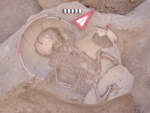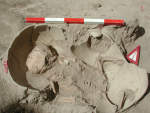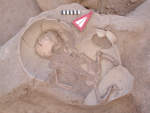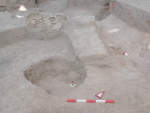1. OVERVIEW
| Roster | Date | Author | Record |
|---|---|---|---|
| Category | !! | !! | organic |
| Best definition | 2002-09-14 | !! | human body [Input: M917LR.j] |
| Best image | 2011-12-12 | lC |  v110a [Input: VZ12LC.j] |
2. IDENTIFICATION
Designation
| Roster | Date | Author | Record |
|---|---|---|---|
| Definition | 2002-09-14 | lR | human body [Input: M917LR.j] |
| Description (summary) | 2002-09-18 | aP | Inside the jar we discovered a human body, belonging to a baby, of female sex (presence of earrings). The position is not fetal, the legs are open and the arms go down along the hips so it seems that the baby is sleeping. On the right and on the left ear lie small ring shaped bronze earrings. The bones, except for the skull are in a good state of preservation (we also found the fingers/fingers). Below the left foot, attached to the jar, are small salt crystals. The funerary set consisted of a pair of bronze earrings i124 and i134. No jars or bowls were found except for the jar in which the body was deposed i114. This burial may be associated with another burial that is emerging below this burial. [Input: M917AP.j] |
| 2002-09-20 | MISSING | Skeletal remains of a small child laid across the ceramic jar i114 and i115. [Input: N116LR3.j] |
3. STRATIGRAPHY
Volumetric Localization
| Roster | Date | Author | Record |
|---|---|---|---|
| Locus | 2002-09-14 | lR | k205 [Input: M917LR.j] |
| Relays (applicable to elements) | 2002-09-14 | ap | r404 (41719 37003 - 8510 / Relay location: @bottom of item) [Input: R7QFAB1R.j] |
Contact Association
| Roster | Date | Author | Record |
|---|---|---|---|
| Type of contact: contemporary events/movable items | 2002-09-14 | lR | i123 (human body) sits in f304 (fill) [Input: M917LR.j] |
Spatial Aggregation
| Roster | Date | Author | Record |
|---|---|---|---|
| Aggregate (to which element belongs) | 2000-12-18 | !! | a20 (burial) a28 (pit) [Input: A-CUMUL.j] |
Time Sequencing
| Roster | Date | Author | Record |
|---|---|---|---|
| Stratum (to which element belongs) | 2015-05-20 | !! | s330AAH [Input: ZA520CJC.j] |
| Phase (to which element belongs) | 2015-05-20 | !! | h5hAAH [Input: ZA520CJC.j] |
4. TYPOLOGY
Morphology
| Roster | Date | Author | Record |
|---|---|---|---|
| Color | 2002-09-14 | lR | remains of a small child laid across two halves of a ceramic vessel [Input: M917LR.j] |
6. REFERENCE
Analogical Record
| Roster | Date | Author | Record |
|---|---|---|---|
| Photo of individual elements (studio) | |||
| View/drawing of item | |||
Disposition
| Roster | Date | Author | Record |
|---|---|---|---|
| Notes on disposition | 2012-02-04 | lC | to Natural science Lab [Input: W204LC.j] |
Files and Publications
| Roster | Date | Author | Record |
|---|---|---|---|
| Project publications | 2025-03-07 | mDP | Kharobi 2014, p. 140. [Input: ZJ225_biblio_mDP.j] |
Zpa. PHYSICAL ANTHROPOLOGY
IDENTIFICATION
| Roster | Date | Author | Record |
|---|---|---|---|
| Definition | 2007-08-06 | lr | hs [Input: R815LR.j] |
| Minimum number of individuals | 2007-08-06 | lr | 1 [Input: R815LR.j] |
SKELETAL ANALYSIS
| Roster | Date | Author | Record |
|---|---|---|---|
| Biological sex | 2007-08-06 | lr | unknown [Input: R815LR.j] |
| Biological age | 2007-08-06 | lr | infant [Input: R815LR.j] |
| Data on biological age | 2007-08-06 | lr | infant, 5-12 months of age estimated through multiple aging techniques. The diaphyseal length of the long bones; Humerus 66mm, Ulna 85mm, radius 74mm, tibia 95mm, femur 113 mm using Hoppa 1992 suggests this is an infant of 12 months. Bone ossification places this infant within 9-12 months of age with the mandible fused (>6-9 months) while the vertebral bodies remain un-fused (<12 months) via Buikstra and Ubelaker 1994. Deciduous teeth formation estimates this infant within 5-10 months; canine at stage Crc= 5-8 months, molar 1 at stage r1/4= 5-10 months, and permanent molar 1 at Coc= 6 months via Moorees, Fanning and Hunt 1963; Smith 1991. [Input: R815LR.j] |
PATHOLOGY
| Roster | Date | Author | Record |
|---|---|---|---|
| Pathology type | 2007-08-06 | lr | pr [Input: R815LR.j] |
| Pathology location | 2007-08-06 | lr | left ulna, left fibula [Input: R815LR.j] |
| Pathology description | 2007-08-06 | lr | The left ulna and fibula show signs of periostitis, an inflammation of the periosteum either through trauma or infection, with evidence of woven bone formation on the shaft that takes on a porous appearance. The inflammation is nonspecific resulting from either periostitis as the primary disease or as a secondary reaction of another disease. No other skeletal lesions where noted. In archaeological skeletal material, periosteal inflammation of the long bones forms the most common pathological condition recorded (Ortner 2003). [Input: R815LR.j] |
PRESERVATION
| Roster | Date | Author | Record |
|---|---|---|---|
| Condition of skeleton | 2007-08-06 | lr | gd [Input: R815LR.j] |
| Convervation notes | 2007-08-06 | lr | The bones were found in good condition with 43% post cranium, 85% skull, and <75% of the ribs complete. [Input: R815LR.j] |
BURIAL CONTEXT
| Roster | Date | Author | Record |
|---|---|---|---|
| Burial type | 2007-08-06 | lr | sj [Input: R815LR.j] |
| Grave orientation | 2007-08-06 | lr | W-E [Input: R815LR.j] |
| Body orientation | 2007-08-06 | lr | supine [Input: R815LR.j] |
| Skull facing | 2007-08-06 | lr | north [Input: R815LR.j] |
| Time period | 2007-08-06 | lr | early Khabur [Input: R815LR.j] |
MEASUREMENTS
| Roster | Date | Author | Record |
|---|---|---|---|
| Max length ulna | 2007-08-06 | lr | 85 [Input: R815LR.j] |
| Max length radius | 2007-08-06 | lr | 74 [Input: R815LR.j] |
| Max length Tibia | 2007-08-06 | lr | 95 [Input: R815LR.j] |
| Max lenght Femur | 2007-08-06 | lr | 113 [Input: R815LR.j] |



